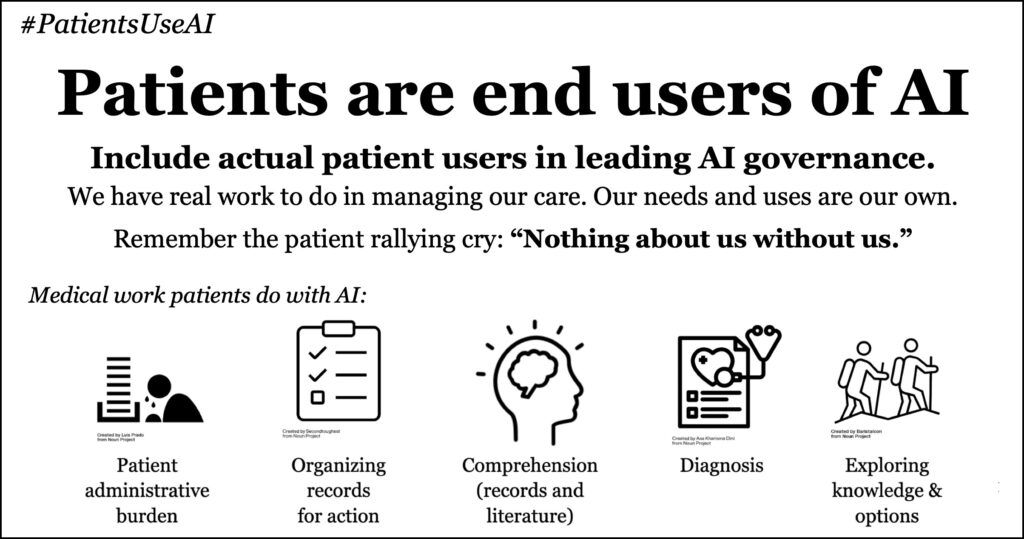These are exciting times for patient empowerment and all of medicine! Knowledge is power and generative A.I. is causing an explosion in it. Patients and families are finding that AI tools like GPT-4, Claude.ai and Gemini can profoundly improve their ability to be informed, empowered, and engaged in their care. Participatory medicine!
The other day Grace Cordovano, the extraordinary board-certified patient advocate, spoke a sentence that opened new worlds: “People need to realize: Patients are end users of AI.” Presto: new hashtag #PatientsUseAI, and an awareness campaign that’s starting right now.
Look at all the ways we’re already using AI to get work done:

Our needs and perspectives must be included in the work that’s underway right now as industry works to guide AI in healthcare (so-called “governance”). But until Grace pointed it out, nobody really noticed that nobody’s talking about patient uses of AI … patients as “end users.” By that we mean:

“Actually uses.” Yes, we do actually use AI. “Is intended to use.” That’s where we need to be heard: both the developers and “governors” of artificial intelligence must know what we need and be sure they get it right.
And that means involving patients in the deliberations and the creation of the governing principles – not doing the work and then asking us later. Because you know what happens with that approach? “Oh – we didn’t think of that. It would be too hard to change at this point.”
We have been there before.
Nothing about us without us.
That famous slogan (dating back to the 1990s!) applies anew today. There’s a danger that well-meaning people will think about patients without asking patients, so their best-intentioned policies will miss the mark. We’ve got to make people aware that patients have real work to do in managing their care, and only we can speak for our own needs.
We’ve spotted at least five categories of work patients we know are already doing with generative AI tools, summarized in the graphic above. In the coming days we’ll be blogging about each of these use cases.
To understand why it’s so important to us that you involve us in leadership directly (not by proxy), remember that we have been down this road before, and related in this blog post from 2015, dating back to disability rights in the ’80s and women’s suffrage in the 1880s:
“When someone else speaks for you, you lose”:
patient empowerment as a civil rights movement
The point (then and now) isn’t that anyone’s trying to overlook our needs – it’s that it just doesn’t work to expect a third party to speak for you.
We’ll be back! In the meantime, let’s start rockin’ that hashtag: #PatientsUseAI.
Because we do, and nobody’s talking about it yet! That’s a mistake that we can correct.
Next in the series: Researching a difficult diagnosis: #PatientsUseAI, example 1


Exactly right!
I love this concept. I wish I had a GPT that I could quickly ask about surgeries or when I had certain medications.
Sounds interesting; what is it that you want to do, and can’t do, today? Have you tried?
Do you mean you want to ask a GPT when you took your pills?? Or on which dates you’d been prescribed them, start & finish?
Excellent post and excellent initiative, Dave! How can I help? Also, stay tuned for the first release of Andaman7, including 3 AI features in the coming weeks. I’d like your opinion on these.
You can help by spreading the word about the hashtag, and especially by sending any stories you hear of patients using AI.
I’ll be very interested to learn what you’re doing with AI. Most people mean that they have some sort of (alleged) AI built in to their product, something they themselves created. But I’m guessing your app goes out and calls on some AI via API to get advice or analysis?
Ok. I will use the hashtag in following posts when appropriate. Stay tuned.
And yes, we are using real AI (not alleged) and we are not reinventing the wheel. However, we try to add our patient perspective to make it really useful to fellow patients – not just a “nice to have feature because AI is the current buzzword”. I actually did AI research when I started my career 40 years ago, so I know some history on AI. And I can testify that it has improved a lot and that, what we see today, is a real innovation (or better: a real discovery).
Ok. We created several posts on LinkedIn and X (search for Andaman7 and check our posts). We also published a page on our web site and we used #PatientsUseAI where we could. See https://bit.ly/a7nwai (Andaman7, now with AI). This is new for all of us, so please share your feedback so we can improve.
#PatientsUse AI is a great value proposition! As a stroke patient myself and a health informatics enthusiast to adopt AI to convert healthcare insights into rewarding healing experiences, I have been focusing on being an “AI users-advocate” for the past year. For instance, learning about the AI concept of Backpropagation has motivated me to re-balance the various weights of my treatment and rehabilitation regimens, purported to improve my prognosis and eliminate any risk of a potential second stroke. With the overwhelming volume of personal health / financial data to maintain, having a user-friendly AI data-assistant will come a long way to help reduce my overall stress level and get on the path for long-term healing.